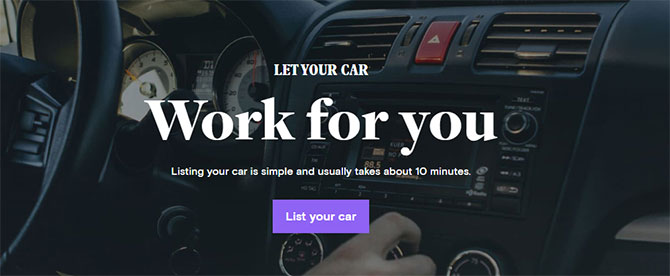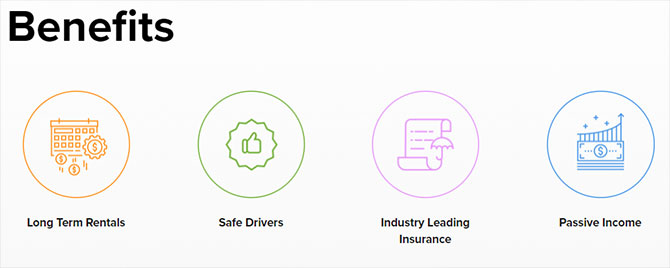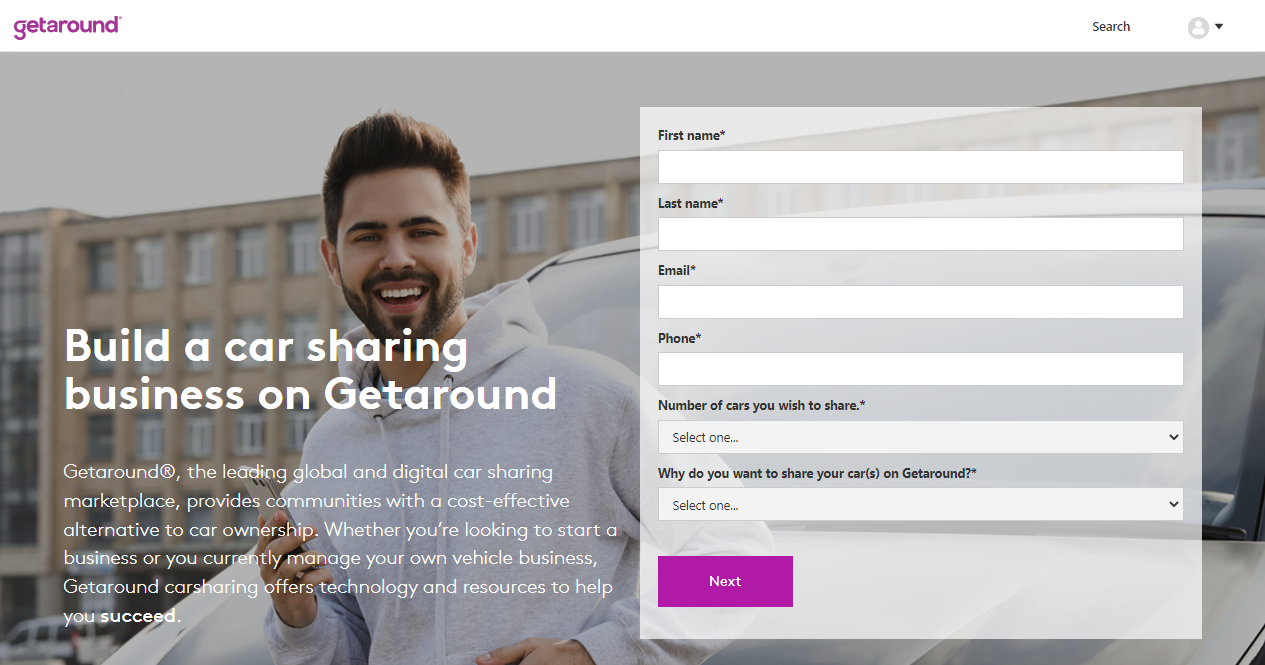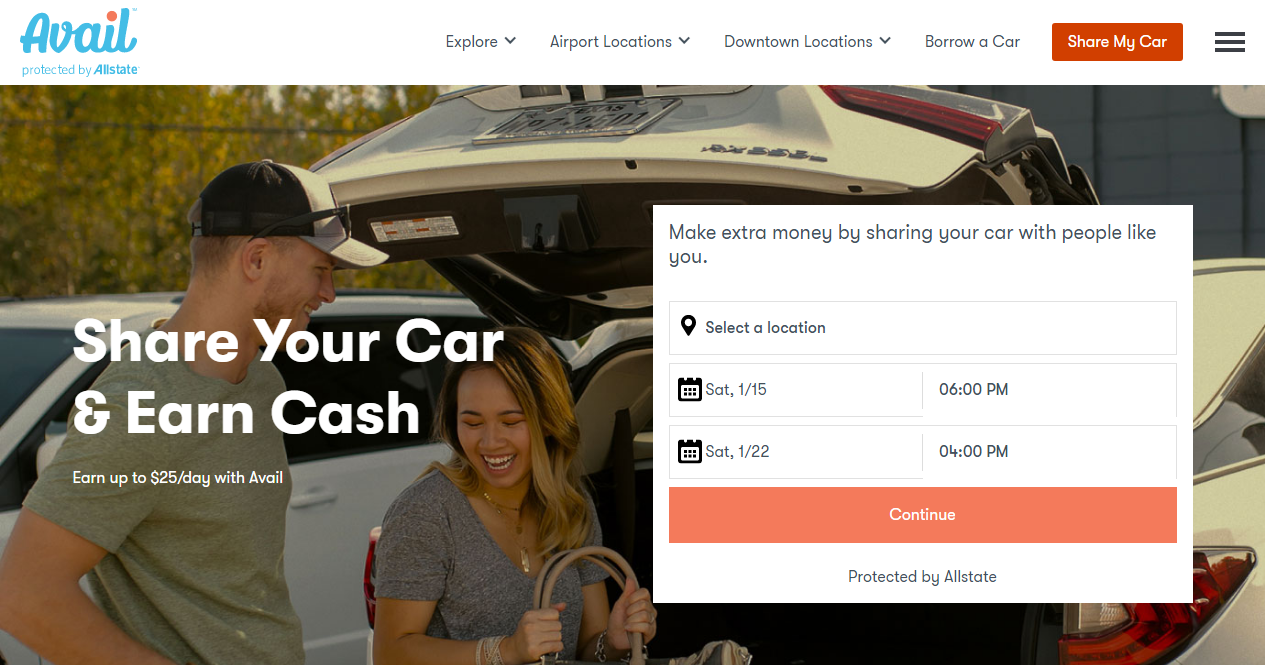If you have a car or two spending a lot of time sitting idle in your garage, why not rent your car and put it to work for you?
- Inbox Dollars - Get paid to check your email. $5 bonus just for signing up!
- Survey Junkie - The #1 survey site that doesn't suck. Short surveys, high payouts, simply the best.
- Nielsen - Download their app and get paid $50!
With services and apps that connect your car to those who need it, you can have your car listed in less than an hour.
But I’m sure you have questions about it. How does it work? How safe is it? How much can you make?
Today, you’ll learn about the apps you can sign up for, the pros and cons of renting out your car, and how to maximize your profits.
How to Rent Out Your Car: The Best Car-Sharing Apps
With many apps popping out as the go-between of the service provider and client, companies have found a business idea that involves an app for easy access, and a car rental concept now called “car sharing marketplace.”
If you’re interested in how to rent out your car, these four options should help you get started.
Do note that each option comes with its own Pros and Cons, so be sure to read through the list and find the app that best suits your needs.
1. Turo
Founded in San Francisco in 2009 as RelayRides, the company went national in 2012 and re-branded as “Turo” in 2015.
Turo is the most popular car-sharing marketplace out there today.
It’s been dubbed as the Airbnb of cars because Turo doesn’t own or maintain any cars (much like Airbnb doesn’t own any properties being rented out on the site).
Reasons to Choose Turo:
- They’re the most popular company of its kind
- Operates in more than 7,500 cities across 56 countries
- The website has a lot of information
- Up to $750,000 in liability insurance (You have to dig deeper into the ins and outs of Turo insurance. Each location has different policies.
Reasons to Skip Turo:
- Since July 2019, Turo changed policies that prevented hosts from sharing their cars on any other car-sharing service. So you either go with Turo exclusively or not at all.
How to Rent Out Your Car on Turo
- Download the app, or open an account on the Turo website.
- Check if your car qualifies: less than 12 years old, 130,000 miles or less, clean title, and with a fair market value of up to $150,000
- List your car, adding photos and all the necessary information about your vehicle.
- Fill out a calendar (When is the car available? Where can it be picked up?)
- Set price and some rules (max daily mileage, etc.)
- Wait for someone to book your car through the Turo website or the Turo app. As a host, you have control over accepting or declining the booking request.
- Contact the client if you have inquiries about the booking.
- When you accept the booking, you’ll have to set meeting details (where/when you’ll meet).
- During the meeting time, the traveler will check the car for issues, while the host checks their driver’s license, and discuss the rules and dropoff details.
- Once the car is given back to you without issues, Turo initiates payment three hours after the trip ends (more if it’s your first time). You’ll get the payment in three to five business days via Stripe.
How Much Can You Make Renting Your Car with Turo?
Turo claims that the average US host earns $700+ per month for renting out their car. You can also estimate your potential earnings by using their Carculator.
Turo takes 15% to 35% of rental income, so you’ll earn 65% to 85% of the trip price.
However, the total price depends largely on the insurance coverage you choose.
For example, if you have commercial rental insurance and you’d like to skip the vehicle protection plans offered by Turo, Turo lowers its commissions and allows you to earn up to 90% of the trip price.
2. HyreCar
HyreCar is similar to Turo, but they’re focused on people who want to rent a car that they can use to drive for Uber, Lyft, Postmates, Grubhub, or any other rideshare or delivery service in the hopes of earning money in the in-demand industry.
Because of this, the cars that they allow to become “hosts” are often newer models and have passed the qualifications of Uber, Lyft, and the like.
Reasons to Choose HyreCar:
- If you want to rent out your car for longer periods
- If you’re OK with the client using it to earn money driving for Uber, Postmates, or other similar services
- If you want to list your car on other car-sharing marketplaces
- HyreCar is in all 50 states
- Get a $200 deposit from the renter
Reasons to Skip HyreCar:
- If you’re worried about extending the life of your car. Another driver will be responsible for it when you rent it out, and you have little to no control over how they use your car.
- Uses Zendesk as customer support, which means you only get answers via e-mail instead of actually talking to someone
How to Rent Out Your Car on HyreCar
- Sign up and create a free listing.
- Post details about your car and upload photos, registration, inspection papers from Uber or Lyft.
- Wait for a driver to apply to your listing. (Applications expire within 24 hours, so answer asap).
- When you confirm an application, check driver documents and insurance documents.
- Handoff the keys to the driver, while verifying license and stating mileage/fuel parameters.
- Wait for HyreCar to pay you.
- Get your car back from the driver, double-checking car condition
How Much Can You Make Renting Your Car with HyreCar?
HyreCar explains that car owners can obtain a steady source of passive income resulting from a re-booking process.
According to HyreCar’s website, the average car owner makes $10,000 to 15,000 per year renting out their vehicle through the site, but the real amount is usually lower than what HyreCar is making us believe.
Car owners get a weekly rental payment, but a 15% HyreCar fee is subtracted from the total.
3. Getaround
Founded in 2009, San Francisco-based Getaround is another peer-to-peer car-sharing company that empowers people to rent and drive cars hassle-free directly from other people who are listing their cars for rent locally.
No joke. Here are the fastest ways to make easy money online. Click here to see how.
What makes Getaround different from Turo and HyreCar is that the company has developed its own technology to support the service.
Their Getaround Connect™ technology allows renters to find, rent, and unlock cars right from their phones, which means owners do not need to meet with renters personally anymore.
However, the problem with technological advancements is that this comes at a price.
- Getaround charges a one-time $99 installation fee for GetAround Connect
- Although you do get a free 30-day trial, once up, you’d have to shoulder $20/month in subscription fees to continue using Getaround Connect
Reasons to Choose Getaround:
- Better insurance ($1 million insurance policy for the duration of the trip, including comprehensive, collision, and liability coverage)
- Available in 300 cities in 7 countries
- No need to meet up with drivers
- Impressive Getaround Connect technology
Reasons to Skip Getaround:
- Monthly subscription fee
- Your car depreciates
How to Rent Out Your Car on Getaround
Renting out your car via Getaround is the same as Turo and HyreCar, except for the part where you meet with the driver for pickup and drop-off.
The cool thing about Getaround is that renters pick up your car in a pre-determined spot and then put it back there once done with the rental.
How Much Can You Make Renting Your Car with Getaround?
Getaround claims that some owners make up to $10,000 per year (that’s around $800 a month), which isn’t too realistic. Unless your car is being rented out several hours daily, 365 days of the year, which is highly unlikely.
Car rental fees are around $6 to $10/hour. From this amount, Getaround keeps 40%, and the car owner takes home 60% of the rental rate, which is paid once a month via PayPal or check.
Note that their commissions may seem pretty steep, but Getaround already includes full insurance and roadside assistance with every rental.
4. Avail
Avail, formerly known as Drift, is another peer-to-peer car-sharing service. What makes it different is that Avail’s pickup and drop-off locations are in airports to allow car owners to rent out their cars while they’re on vacation.
They’ve branched out to select communities to offer park and share services as well.
Reasons to Choose Avail
- Earn while you’re on vacation.
- Free parking, free carwash, and free ride to the terminal, even when your car is NOT being shared.
- There’s a mileage limit of 150 miles, so your car doesn’t get too broken down
- No need for actual meetups
Reasons to Skip Avail
- Available only in a few locations
- They won’t accept manual transmission or electric vehicles
How to Rent Out Your Car on Avail
- Sign up on the app or on their website.
- Make sure your car is eligible (2013 or newer, less than 125,000 miles, and other eligibility requirements).
- Register your car.
- Pull up to the Avail lot in the airport so their staff can check it in, inspect, and clean it.
- Wait for borrowers to reserve your car, use it, and return it to the lot.
How Much Can You Make Renting Your Car with Avail?
You get paid a fixed amount a day: $20 for standard, mid-sized, and vans, and $25 for large SUV owners.
Pros And Cons of Renting Out Your Car
Renting out your car to strangers does have its pros and cons. Look through these pros and cons before you make a decision on whether to rent out your car.
Pros
- Registered renters are pre-screened. Car-sharing apps usually do a full background check as well as a DMV check on those who intend to rent using their app. This means you don’t have to do it yourself and you can rest assured that you know who is using your car.
- Your car makes money on your schedule. Car-sharing services normally allow car owners to mark themselves as active and inactive whenever they want. So if you need your car, you can use it.
- Car-sharing companies cover your insurance. Personal auto insurance won’t cover damages to your car while being rented for profit. It’s standard practice for car-sharing services to provide comprehensive and collision insurance to those who are renting out their cars.
- You may be eligible for tax deductions. Some rental properties are eligible for tax deductions. Check with the IRS or a tax expert to find out if your vehicle is eligible and exactly how much you can claim.
- You can earn passive income. You can earn as much as $800 per month as extra income while exerting minimal effort.
Cons
- Maintenance increases dramatically. This is especially true the more you rent out your car. Since the car is your property, you’re responsible for making sure it meets state inspection guidelines.
- Your car may come back damaged. Yes, insurance should cover any damages from collisions or accidents, but there’s always a chance that your insurance will deny your claims.
- You can’t control your renters’ behavior. From the experiences of those who have rented out their cars, their vehicles sometimes came back smelling of cigarette or marijuana smoke, or the interiors damaged. Unfortunately, there’s little you or the car-sharing services can do but to clean and repair the damage as best as you can. Remember, you’re responsible for keeping your car constantly clean and well-maintained.
- The resale value of your car can decline faster. All cars depreciate over time, but the value of a vehicle that’s constantly in use will likely decline faster than a rarely used one.
Tips For Renting Out Your Car
As you may already have learned, renting out your car can make you a tidy sum of cash.
Here are some more tips to ensure you maximize your profits while minimizing your risks.
- If you’re still paying for your car, talk to your lender first. You might have been interested in renting your car because it can help you make your car payments, but your lender might take issue with that and may even repossess your car. Clear your plans with them first.
- Invest in making your listing attractive. Take multiple photos of your (clean!) car from different angles, mention special features, and set a competitive price.
- Inspect and take photos of your car before and after every trip. In case your car gets into an accident or somehow damaged during a trip, it pays to have documentation. Your insurance company will ask for this as well as the car-sharing companies you’re working with. Make sure the entire exterior and interior are documented, from the condition of the tires and engine to the dashboard.
- Read through all the terms and conditions carefully. This should be an obvious thing, but this is worth drilling in: always read the fine print. No matter which car-sharing service you sign up with, you need to be fully informed about what you’re getting into. Most importantly, you need to be clear about what the coverage is in case your vehicle gets damaged, totaled, or stolen.
- Shop around for insurance. Before you put your car up for rent, make sure it’s actually allowed by your insurance company. Call several companies and compare prices if needed. Don’t be shy about asking if there is a better deal available; an agent may be able to find one. If you buy your car on credit, look for no-down-payment auto insurance options and ask your agent if they have any special offers.
Starting Renting Your Car Out Today!
Renting out a good quality vehicle that you rarely use is a good way to make some money while helping out those who need your car.
But this isn’t the only way to make money from your vehicle.
If having strangers drive your car doesn’t sound very appealing to you, here are some ways to get paid to drive.
Or if you have a pickup truck and the money you’d make renting out through these apps doesn’t seem enough to cover your gas money and other expenses, here are some jobs for pickup trucks that can make you money.
You can make money from home and it doesn't have to be challenging. Click here to see how.
While we’re on the subject of renting out your property, we’ve written about how to rent out your stuff and how to rent out your house. Your assets shouldn’t be lying idle when they can make you decent side cash.









